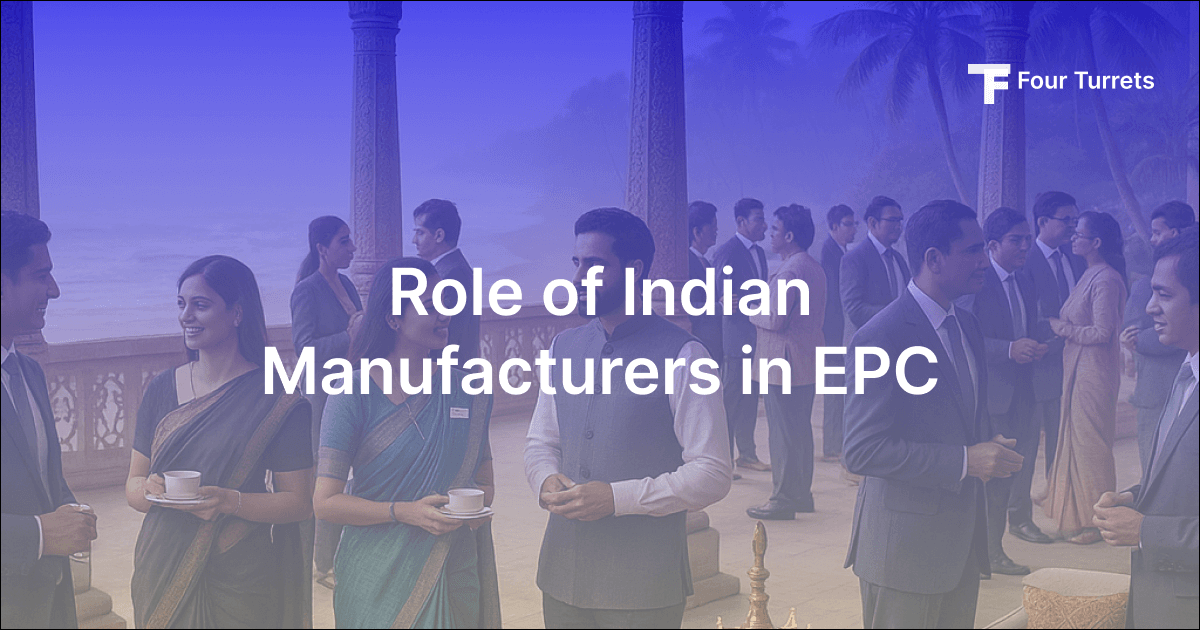The Engineering, procurement and construction (EPC) contractors are constantly seeking reliable, cost-effective and innovative partners to grow. Over the past decade, Indian manufacturers have emerged as the go-to choice for EPC contractors worldwide. From building oil & gas plants to managing automated operations in pharma companies with high quality equipment, local manufacturers are building systems that help EPCs grow their business. This shift is driven by India’s robust manufacturing ecosystem, competitive pricing, skilled workforce, and a proven track record in delivering quality products for complex construction projects.
As global supply chain management faces new challenges and opportunities, understanding why Indian manufacturers are leading the way is crucial for professionals in construction management, procurement, and project management.
The Rise of Indian Manufacturers in EPC Projects
1. Competitive Advantage in Cost and Quality
Indian manufacturers offer a unique blend of cost-effectiveness and high-quality output. With lower labour costs and access to raw materials, Indian suppliers can deliver products at competitive prices without compromising on quality. This is particularly attractive for EPC contractors managing large-scale construction projects with tight budgets and timelines.
2. Advanced Engineering and Manufacturing Capabilities
India’s manufacturing sector has made significant strides in adopting advanced technologies, automation, and quality control systems. From precision engineering to modular construction components, Indian companies are equipped to meet the stringent requirements of global EPC project management.
3. Robust Supply Chain Management
Indian manufacturers have developed resilient and sustainable supply chain management practices, enabling them to handle complex procurement needs and adapt to global supply chain disruptions. Their experience in navigating logistical challenges ensures timely delivery and project continuity for EPC contractors.
4. Skilled Workforce and Project Management Expertise
India boasts a large pool of skilled engineers, technicians, and project managers. This talent base enables Indian manufacturers to collaborate effectively with international construction companies, ensuring seamless integration across the design and construction phases.
5. Government Support and Policy Initiatives
The Indian government’s focus on “Make in India” and export-friendly policies has further strengthened the country’s position as a manufacturing hub. Incentives for exporters, streamlined regulations, and infrastructure investments have made it easier for Indian companies to serve global EPC contractors.
How Indian Manufacturers Address Supply Chain Challenges
Navigating Global Supply Chain Disruptions
The COVID-19 pandemic and geopolitical tensions have exposed vulnerabilities in global supply chains. Indian manufacturers have demonstrated agility in overcoming these challenges by diversifying sourcing, leveraging digital supply chain management tools, and building strong relationships with logistics partners.
Customization and Flexibility
EPC contractors often require customized solutions for diverse construction projects. Indian manufacturers excel in offering tailored products and flexible production schedules, helping contractors meet specific project requirements and deadlines.
Quality Assurance and Compliance
Indian suppliers adhere to international quality standards and certifications, ensuring that products meet the rigorous demands of engineering and construction projects worldwide.
The Future of EPC Projects: India’s Expanding Role
Embracing Digital Transformation
Indian manufacturers are investing in digital technologies such as IoT, AI, and data analytics to enhance efficiency, traceability, and transparency in the supply chain. This digital transformation is positioning India as a leader in the future of EPC project delivery.
Sustainability and Green Construction
With a growing emphasis on sustainable construction, Indian manufacturers are adopting eco-friendly practices and materials. This aligns with the global shift towards green building and responsible procurement.
Strategic Partnerships and Global Expansion
Indian companies are forming strategic alliances with international EPC contractors, expanding their footprint in markets across the Middle East, Africa, Europe, and the Americas.
Conclusion
Indian manufacturers have firmly established themselves as indispensable partners for global EPC contractors. Their strengths in cost, quality, innovation, and supply chain management are driving the future of engineering and construction worldwide. As the engineering and construction industry continues to evolve, Indian suppliers are set to play an even greater role in shaping the success of global construction projects.
What advantages do Indian manufacturers offer to global EPC contractors compared to other regions?
Indian manufacturers provide a unique combination of cost efficiency, high-quality standards, advanced engineering capabilities, and a skilled workforce. Their ability to deliver customized solutions, adhere to international compliance, and maintain robust supply chain management makes them highly attractive to global EPC contractors.
How do Indian manufacturers help EPC contractors overcome supply chain challenges in large-scale construction projects?
Indian manufacturers leverage resilient supply chain management practices, digital tools, and strong logistics networks to ensure timely delivery and project continuity. Their flexibility and experience in handling complex procurement needs help EPC contractors navigate global supply chain disruptions effectively.
What trends are shaping the future of EPC projects with respect to Indian manufacturing and global supply chain management?
Key trends include the adoption of digital technologies for supply chain optimization, a focus on sustainability and green construction, and the formation of strategic global partnerships. These trends are positioning Indian manufacturers as leaders in the future of EPC contract delivery.







